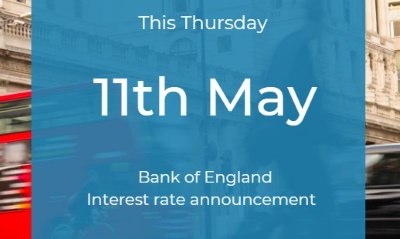Further reading
The Bank of England is expected by many to raise interest rates for the 12th time in under two years, this Thursday, May 11, 2023. The base rate currently sits at 4.25%, the highest level in over a decade, and many economists are predicting another raise this week.
Previously, we mentioned how inflation had fallen less than expected in March, still sitting at 10.1%. This led to the Bank of England hiking interest rates in the hope people would save more, lowering the demand for spending, which would hopefully lead to lower prices.
Interest rates are used as a tool to manage inflation and economic growth. If inflation is too high, central banks may raise interest rates to slow down borrowing and spending, which can help bring inflation back under control. On the other hand, if the economy is sluggish and growth is low, central banks may lower interest rates to encourage borrowing and spending, which can stimulate economic activity.
A rise in interest rates can have various impacts on different sectors of the economy. It can increase the cost of borrowing for consumers and businesses, which can slow down spending and investment. At the same time, higher interest rates can attract foreign investors seeking higher yields on their investments, which can strengthen a country's currency.
It's important to note that any central bank's decision to raise or lower interest rates is based on a complex analysis of various economic indicators, including inflation, employment, and GDP growth. The Bank of England is no exception, and it is likely to carefully consider all available information before making any decisions on interest rates.
So what will this mean for the property industry?
Those on tracker mortgages see an instant increase in their interest rates, and those on fixed deals are shielded in the short term. Although they will pay worse rates once their current deals come to an end.
There are some upsides to a base rate rise as well.
Fixed accounts, where savers lock their money away for a set period of time at a pre-agreed interest rate, will not change in the short term, but for those opening fresh accounts, rates should become more competitive, at least in the long term. This could see investors selling up their investment properties where they no longer see the income they once did or where their mortgage deals are due to come to an end.
As with any 'sell-off' of properties, this could open opportunities for smaller investors. If the larger investors are cutting their losses, and wanting quick sales, we would likely see a lot of these sales coming through auction.
The decision on the rise in interest rates will be published at 12 p.m. on Thursday, May 11, 2023.
UPDATE - Thursday, May 11, 2023:
With interest rates confirmed today at 4.5% from 4.25% we expect to see yet more landlords considering selling. Such financial strains on landlords adds increasing pressure for quick sales.
So, the likelihood is, these will come through auction. Auctions unlike estate agencies often sell properties as tenanted, so auctions are often the preferred route for landlords looking to sell. This could open many opportunities for smaller investors or those that aren’t under such financial strain.
Essential Information Group - News and Information
Keep up to date with our latest news, case studies and what's going on in the property auction industry on our blog.

Buying at auction
20/03/2025
Why the Property Auction Market is Booming Due to Stamp Duty Changes
The UK property auction market is experiencing a surge in activity in March 2025, driven primarily by impending changes to stamp duty regulations

Buying at auction
27/02/2025
Who Can Benefit from Buying a Property at a UK Property Auction?
Buying a property at a UK property auction can be advantageous for various buyers depending on their financial situation and goals. Auctions often offer unique opportunities, discounted properties, and a fast purchase process. Here’s who can benefit the most.

Buying at auction
24/02/2025
Bridging Loans Explained: A Guide for Property Auction Buyers
A bridging loan is a short-term financing solution, typically lasting up to 12 months. It provides immediate funds to bridge the gap between purchasing a property and securing long-term financing.
